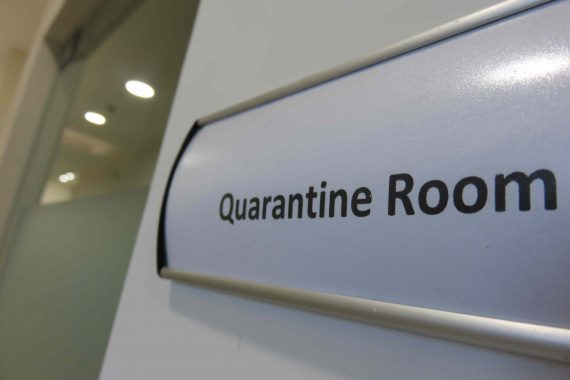GPs should advise patients travelling from parts of Italy to self isolate, says PHE

GPs should advise patients who have recently travelled from parts of Italy to self isolate, even if they do not have symptoms of the coronavirus (Covid-19).
This comes as Public Health England has updated the list of countries most affected by the virus.
Category 1 countries and areas mean that travellers should immediately self isolate, even if asymptomatic, and call NHS 111 to inform of recent travel.
These are now: any Italian town under containment measures; Daegu or Cheongdo (Republic of Korea); Iran and, as before, Wuhan city and Hubei Province in China.
The guidance said: ‘If you have returned from these specific areas since February 19, you should call NHS 111 and stay indoors and avoid contact with other people even if you do not have symptoms.’
PHE has also updated Category 2 countries and areas. These are now Cambodia; China; Hong Kong; Japan; Laos; Macau; Malaysia; Myanmar; Singapore; Taiwan; Thailand; Vietnam; Republic of Korea and northern Italy. The latter two excludes the areas specifically referred to in Category 1.
Travellers from Category 2 regions are not required to undertake special measures, but are requested to self isolate and call 111 should they develop symptoms.
As of yesterday, 6,536 people have been tested in the UK, of which nine were confirmed positive. This figure doesn’t include the four confirmed cases from the Diamond Princess cruise ship, who arrived in the UK and received test results from Japan.
Italy has seen a sudden surge in diagnoses – now totalling 219, with seven deaths – subsequently placing 50,000 people in a dozen towns into lockdown and cancelling Venice Carnival.
It comes as GPs around the country voiced concerns yesterday that advice on Covid-19 did not reflect the escalating outbreak, including developments from Italy.
Since the coronavirus outbreak worldwide, Public Health England (PHE) and NHS 111 have provided limited updates to their guidance for primary care practitioners.There have now been 13 confirmed cases in the UK.
NHS England reiterated to Pulse that information on NHS 111 is based the case definition set by chief medical officer Professor Chris Whitty.
Prior to the update, PHE’s advice to GPs was that at-risk patients were those who have travelled to China, Hong Kong, Japan, Macau, Malaysia, Republic of Korea, Singapore, Taiwan, or Thailand within 14 days, or been in contact with confirmed cases of Covid-19.
This left some GPs in limbo yesterday, while awaiting updates to guidance.
Kent GP Dr Stephanie deGiorgio told Pulse: ‘GPs are suffering from lack of information as time goes on. The Government doesn’t list Italy as a source country, but many GPs being contacted by people returning from northern Italy, with and without symptoms today.
‘They don’t meet the criteria for swabbing, so what on earth do we do? And if we have seen a symptomatic patient without personal protective equipment (PPE), which no one has supplied to GP surgeries, should be we off work?
‘We all know this is an evolving situation, but it feels like an information vacuum from those who should be coordinating the response, is causing uncertainty and potentially increasing risk.’
Dr Richard Cook, a GP in Brighton, where the first cases were confirmed, agreed that PHE and 111 are inconsistent. He shared how it took ‘many hours and phone calls’ to arrange a swab for a colleague, while local hospitals initially refused to admit a pneumonia patient, due to the fear of Covid-19.
Separately a London GP, who wished to remain anonymous, said he encountered symptomatic patients from affected regions of Italy whilst working with NHS 111 on the weekend who were not being tested or isolated, because the list of at-risk countries hadn’t been updated. Despite believing there was ‘clearly a major problem’, he was advised by an infectious diseases consultant to adhere to the guidance.
GPs have questioned the management of various aspects of the handling of COVID-19. Last week, the BMA called for PPE to be supplied to practices, but NHS England deemed it unnecessary.
Similarly, the BMA urged NHSE to allow GPs to switch off their online booking systems to protect practices from the spread of the virus. NHSE also denied this request, but practices nationwide defied the stance.
On 11 February, Pulse reported that 111 was still directing patients with flu-like symptoms to consult their GP, without asking whether they have travelled from regions then deemed to be worst-affected by COVID-19. The previous weekend, the BMA’s GP Committee raised the issue with NHS England and DHSC but were still awaiting updates.
The week before last, Surrey GP Dr Dave Triska also spent almost five hours trying to access a swab for a potential COVID-19 patient, being declined because they didn’t fit the criteria, before eventually being transferred to an isolation pod – a scenario that still appears to be replicating.
Several practices, including in Northamptonshire, Somerset and Berkshire, closed due to the virus; while two GPs and an A&E worker in Sussex were confirmed to be among the cases and PHE was ‘racing’ to locate patients who may have been seen by them.
The Department of Health and Social Care have been contacted for comment.
This article was updated at 09.56 on 25 February to reflect the update to Public Health England’s guidance.
Pulse July survey
Take our July 2025 survey to potentially win £1.000 worth of tokens











